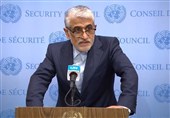US-British-Saudi Support to Salafi Terrorists Led to Decades of Suffering, Says Analyst
TEHRAN (Tasnim) – An author and analyst based in Sweden highlighted the root causes of the emergence of the Daesh (ISIS or ISIL) terrorist group, whose leader was recently killed in Syria, and said the US-British-Saudi support to Salafism has produced suffering and destruction by such groups.
“The US-British-Saudi support to “Salafist jihadism” has produced incredible suffering and destruction over the past three decades,” Hussein Askary said in an interview with Tasnim.
Askary is an Iraqi-born Swedish citizen. He is the Southwest Asia Coordinator of the International Schiller Institute. Askary has worked as an economic and strategic analyst on Southwest Asia and North and East Africa for the Washington-based weekly magazine Executive Intelligence Review since 1996. He is the co-author of several books on the New Silk Road strategy and its impact on the world economy. His latest book-length special report "Extending the New Silk Road to West Asia and Africa" was published in November 2017. He has spoken on these matters in international conferences and seminars in Sweden, Denmark, Germany, France, Egypt, Sudan, Iran, Japan, and China. In 2018, he wrote an 80-page study on the reconstruction of Yemen and China's Belt and Road Initiative.
The following is the full text of the interview:
Tasnim: US President Donald Trump declared Sunday that Daesh leader Abu Bakr al-Baghdadi was dead after a US military raid in northwest Syria over the weekend. In reaction, the spokesman for Iran’s administration, Ali Rabiei, shrugged off the US president’s announcement and said Washington’s policies are the main reason for the emergence of Daesh, adding that the death of Baghdadi does not mean that Takfiri terrorism or “Daeshism” has ended. Do you think the killing of the Daesh leader would play a major role in the fight against terrorism in the region or bring an end to the phenomenon given its root causes?
Askary: While it is true that it was the US policy, at least since 2011, that contributed and directly fueled “Daeshism” under President Obama and his allies in Britain, France and other regional forces who wanted to overthrow the legitimate government in Damascus at whatever price, President Trump is not the typical US president. It seems that President Trump has carefully coordinated this current outcome in Syria with Russian President Vladimir Putin. Both sides have had an interest in ending this phenomenon, which goes back all the way to the Afghan war against the Soviet Union in the 1980s. The US-British-Saudi support to “Salafist jihadism” has produced incredible suffering and destruction over the past three decades. I think what we are seeing in Syria is the end of that phenomenon. But it is not thanks to Trump alone, but to Russia, Syria, and Iran too. The Iraqi people also made major sacrifices in the fight to defeat Daesh. Russia is leading and coordinating a movement in the region to end this problem in coordination with all parties. All the major regional powers, including Egypt, China and India favor this policy. A new security architecture for the Persian Gulf region, which Russia is proposing, will potentially usher a new era of stability and security in this troubled region.
Tasnim: The US claims that it has started the withdrawal of its troops from Syria and says its forces shouldn’t be there. What was the main reason behind the US military operation? What do you think about the developments behind the scenes?
Askary: I think we should not say “the US” does this or that. There is no “united” US at the moment. There is a big fight going on inside the US. The people who voted for Trump in 2016 were fed up with the political elites, with meaningless wars and the destruction of the US economy. Trump made a promise to those people in 2016 to end US involvement in wars abroad. He cannot go for reelection now without fulfilling part of that promise. In an October 9 Trump press conference, which has been completely blacked out in the American media itself, he said that he was intending to end “useless” and “endless” wars in the Middle East. But he also said something no American president since Dwight Eisenhower has said, which is that those who are interested in waging and continuing wars are the “military industrial complex”. While many of the things President Trump has said can be criticized, he is right on this one.
Tasnim: According to some analysts, the killing of the Daesh leader changes some things for Trump. It temporarily changes the political conversation away from the impeachment inquiry which began a month ago. What do you think? Wasn’t the operation a show-off for media attention?
Askary: The people who want to impeach Trump are no angels. The same people attacked him for withdrawing US forces from Syria. They want to continue the regime-change policies of Bush and Obama. I think the operation to kill Al-Baghdadi was aimed at showing that the decision to withdraw from Syria “after finishing 100% of ISIS” (in the words of Trump) was correct, and it was intended to silence those who criticized him in Washington that his policy will make Daesh rise again. He wanted to crown that with a big achievement that closes that chapter. Whatever Trump's motivations are, I am sure that the US can no longer be the major player in Syria. According to the plan made by Russia, the Syrian army will regain total sovereignty over its territories, and Turkey will have to accept the new facts. Then Iran, Russia, and Turkey will continue the Astana process to reach a political solution. Trump might go into new adventures as the heat of the presidential campaign increases. That is something to watch out for. The US policy towards Palestine, Iran, and Yemen should be a matter of big concern for us all.






